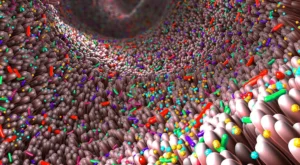ARTICLE SOURCE: https://www.medicalnewstoday.com/articles/309600.php
May 04, 2016
Researchers from McMaster University in Ontario, Canada, came to this conclusion about post-traumatic stress disorder (PTSD) after reviewing recent experimental and clinical data.
From research on laboratory mice, the team found imbalances in the animals’ gut bacteria seriously affected their mood and demeanor.
The researchers also found that stressed mice became calmer when they fed them live bacteria from fecal material collected from calm mice.
The research is part of a project sponsored by the Warfighter Performance Department in the Office of Naval Research, headquartered in Arlington, VA.
ONR Program Officer Dr. Linda Chrisey comments on the team’s work:
“This is extremely important work for United States warfighters because it suggests that gut microbes play a strong role in the body’s response to stressful situations, as well as in who might be susceptible to conditions like PTSD.”
Our digestive tract holds trillions of microbes, without which we could not digest food, defend effectively against disease, and even transmit signals to the brain that affect mood and behavior.
Collectively known as the gut microbiome, they form an integral part of the biology that keeps us alive and well.
Stressed mice had less diverse gut microbiome
To investigate the link between gut microbes and stress, the team exposed smaller mice to larger, more aggressive ones for about 2 minutes a day for 10 days.
Following this “social defeat” scenario, the smaller mice developed signs of increased anxiety and stress – nervous trembling, loss of appetite, and less interaction with other mice.
The team then compared fecal samples collected from the stressed mice with those of calm mice. One of the researchers, Paul Forsythe, assistant professor and principal investigator at the McMaster Brain-Body Institute, explains what they found and its significance:
“What we found was an imbalance in the gut microbiota of the stressed mice. The gut and bowels are a very complex ecology. The less diversity, the greater disruption to the body.”
The researchers then fed live bacteria extracted from the fecal samples of the calm mice to the stressed mice and studied the new fecal samples from the latter. Using powerful, non-invasive imaging technology called magnetic resonance spectroscopy (MRS), they also looked at changes in brain chemistry.
The behavior of the mice changed dramatically following their “probiotic” treatment and continued to improve for weeks afterward. From the brain scans, the team could also see chemical differences in the animals’ brains between their stressed state and when they took the probiotics.
In a paper published in the The Canadian Journal of Psychiatry, the McMaster researchers note that:
“Recent experimental and clinical data converge on the hypothesis that imbalanced gut microbiota in early life may have long-lasting immune and other physiologic effects that make individuals more susceptible to develop PTSD after a traumatic event and contribute to the disorder.”
They suggest it may one day be possible to use stress biomarkers to show if someone has PTSD or is at risk of developing it, allowing for timely treatment or prevention by restoring balance to the gut microbiota – either with probiotics and antibiotics.
The researchers are now planning further experiments with fecal transplants from calm mice to stressed mice, and they also hope to get funding to carry out clinical trials in humans.
ONR is also looking at the possibility of using synthetic biology to create or re-engineer microbes to restore balance to or enhance gut microbiomes. This area of investigation forms part of top priority research because of its potential impact on warfighter performance and naval fleet capabilities.




